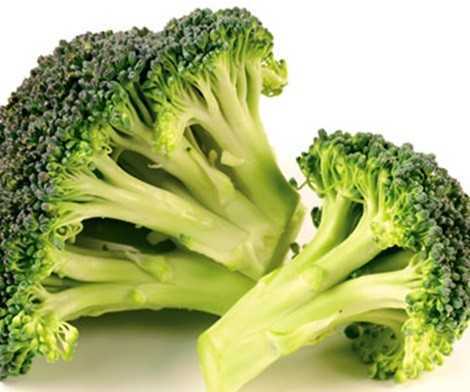
Broccoli is an edible green plant in the cabbage family, which is part of the larger plant family called Brassica oleracea. Since it’s closely linked to cabbage and has many of the same nutrition benefits, the word broccoli comes from the Italian plural of broccolo, which means “the flowering crest of a cabbage.”
University Health News Staff(2018) reports that the darker and more colorful the veggies are, the higher the antioxidant capacity. Many different types of broccoli are grown and eaten throughout the world today.
One recent study by Liu et al.(2018) found that broccoli florets have higher concentrations of amino acids, glucoraphanin and neoglucobrassicin compared to other parts of the plant, whereas broccoli leaves are higher in carotenoids, chlorophylls, vitamins E and K, phenolic content, and antioxidant activity.
Broccoli can be eaten cooked or raw — both are perfectly healthy, but provide different nutrient profiles. Cooking methods affect broccoli (Yuan et al. 2009). This notwithstanding, raw or cooked, broccoli is an excellent source of vitamin C (Hill, 2018).
Cancer prevention
Studies have found that eating cruciferous vegetables may protect against certain types of cancer, namely: breast (Liu and K, 2013); prostate (Liu et al. 2012); gastric/stomach (Wu et al. 2013); colorectal (Wu et al. 2013); renal/kidney (Liu et al. 2013) and bladder (Liu et al. 2012).
A more recent study by Kaiser et al.(2021) explains why Cruciferous vegetables are linked with a reduced risk of gynecological cancers, which proves that they are significant for women due to their effects on estrogen.
One human study by Bahadoran et al.(2012) found that broccoli consumption for one month decreased insulin resistance in people with type 2 diabetes.
A prospective animal study by Suresh et al.(2017) also found decreased blood sugar in addition to reduced pancreatic cell damage in diabetic rats fed broccoli extract.
Due to the higher content of fiber in broccoli, two studies (Silva et al. 2013; Yu et al.2014) found that higher intake of dietary fiber is linked with lower blood sugar and improved diabetic control.
Broccoli, Chromium
Due to the high content of chromium, broccoli is regarded as the food of choice for lowering sugar. For instance, two studies (Pei et al. 2006; Suksomboon et al. 2014) note that, taking chromium supplements can improve blood sugar for those with diabetes.
Two prospective additional studies, (Cefalu et al. 2009; Wang et al.2010) also affirmed that chromium supplements are beneficial for those with higher blood sugar and lower insulin sensitivity.
One large prospective study of over 62,000 adults by McIver et al. (2015) agrees with this exposition and found that the likelihood of having diabetes was 27% lower in those who took dietary supplements containing chromium.
Despite the positive effect of chromium supplements on lowering blood sugar level, other studies of three or more months found no effect (Abdollahi et al. 2013).
Broccoli, weight loss
A study by Tian et al. (2013) reviewed nine different studies, including 622 overweight or obese people to get a complete picture of whether this mineral is useful for weight loss.
The researchers concluded that the impact of this amount of weight loss was questionable and that the effectiveness of the supplement was still unclear.
Eye, skin, gut
The American Optometric Association, agrees that broccoli positively impacts eye health due to high levels of the carotenoids called lutein and zeaxanthin, which are crucial for eye health and maintaining good vision into old age.
They help protect night vision and stop UV damage from occurring within the eyes’ retina and cornea.
Due to the Sulforaphane content in Broccoli, it helps repair skin damage and improves skin health. Its high levels of vitamin A and vitamin C prevent collagen breakdown, skin cancer, UV damage, wrinkles and skin inflammation.
One retrospective study by Yanaka et al.(2009) and one prospective study by Eve et al.(2020) found evidence from human and animal studies that diets high in broccoli can reduce gastric bacterial colonization, lower expression of tumor growth and inflammation, and lead higher antioxidant activity that improves liver function.
Heart health
Two studies by (Bazzano et al. 2002; Zhang et al. 2011) found that higher fruit and vegetable intake, especially cruciferous veggie intake, is correlated with a lower risk of cardiovascular disease.
The high fiber content of broccoli nutrition is excellent for lowering cholesterol naturally and fast. It prevents cholesterol from entering your bloodstream by binding to it and removing it.
Broccoli, bone support
Broccoli nutrition is also loaded with vitamin K, calcium, magnesium and potassium, which are essential for healthy bones, nails and teeth. High levels of vitamin K and iron are vital for maintaining bone mineral density (in addition to having many other benefits, like promoting blood health and boosting your energy levels).
In one article by Crawford (2021), it would take a large amount of cruciferous vegetables to cause any type of hypothyroidism.
It also appears to be a risk primarily for people who have an existing iodine deficiency. Scott et al.(2012) also found that Broccoli has potential to cause allergic reactions and interactions with certain medications, including warfarin.










